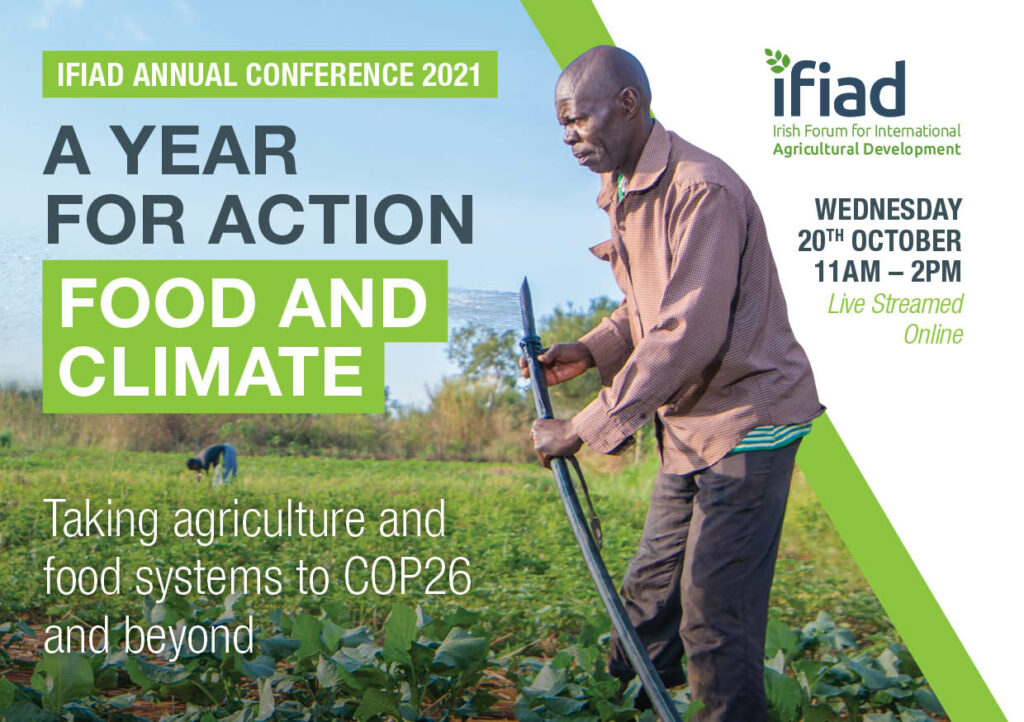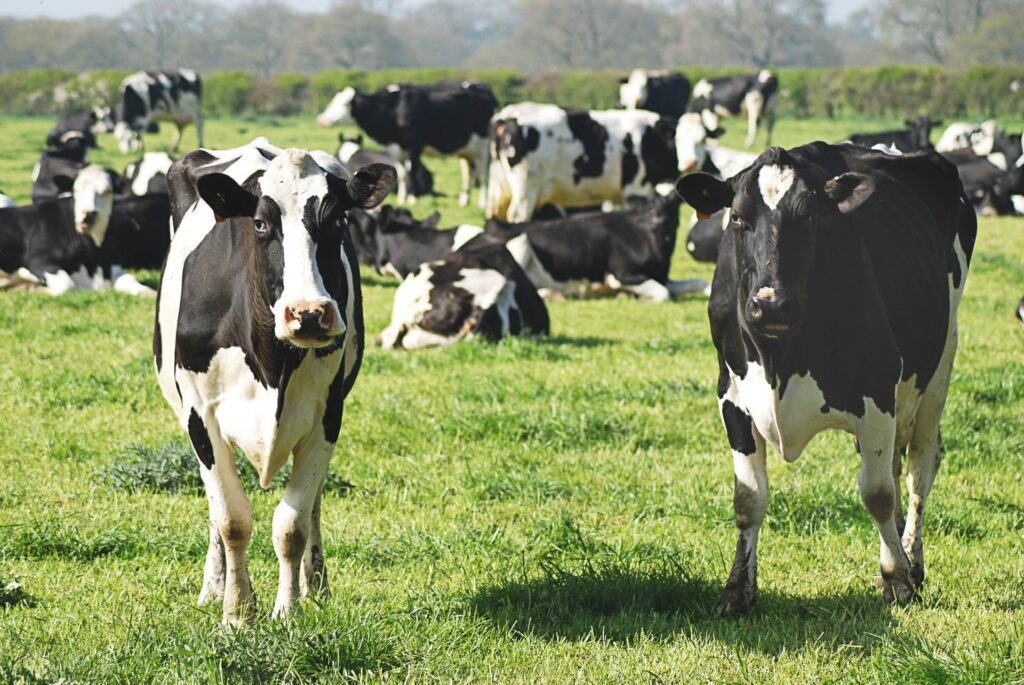Key issues for Sustainable Food Systems and Climate Action raised at the IFIAD 2021 Annual Conference – Is the glass half full or half empty?

The 2021 annual conference of the Irish Forum for International Agricultural Development (IFIAD) was a special one given the upcoming United Nations Climate Change Conference (COP26) in Glasgow in October and the preceding UN Food Systems Summit in September. Consequently, the IFIAD conference was titled “A Year for Action: Food and Climate”. The nexus between food systems and climate change is indeed a crucial one – collectively, food systems account for 29% of global greenhouse gas (GHG) emissions.
Recent trends and developments give limited reason for hope, as was pointed out by IFIAD Chair Prof. Charles Spillane. Progress made on the issue of global hunger came to a halt and might even reverse due to the Covid-19 pandemic and there is a new record high of CO2 emissions, which makes it somewhat unsurprising that the world is tremendously off-track to meet emission reduction targets by 2030. Focusing on agriculture, things do not look great either. Published by the FAO and the OECD, the Agricultural Outlook 2021-2030 report projects a 4% increase of global agriculture GHG emissions – the main reason for that being the expanding livestock sector.
Since this rise is projected despite the adoption of newer and greener technologies in many areas of agri-food systems, an urgent question is what else can be done. As so often the case, the absence of appropriate finance and funding, not only but especially in so-called developing countries, remains to be a predominant problem, as pointed out by Donal Brown, Associate Vice-President (Programme Management Department) at the International Fund for Agricultural Development (IFAD). Another major and consistent topic during the conference was how trust can be increased in implementation processes, an issue which was especially stressed by Sinead Mowlds, an independent consultant specialised in sustainable development and food and nutrition security for rural and marginalised people. She highlighted that one impediment for change in agri-food systems, especially on national levels, is a lack of trust in multi-stakeholder processes, in which the most important actors are farmers, producers, decision- and policymakers, and ultimately, consumers. That their interests, hopes, worries, and targets differ is only natural, but given what is at stake if no revolutionary change towards truly sustainable agri-food systems happens, hard decisions need to be made and actions have to be taken. This can only be done satisfactorily if every actor is involved in the process of transformation. Hence, the necessity to establish and commit to inclusive national dialogues was a recurring theme of the conference, especially, and this was another major point Mowlds made since we seriously need to consider that changes cannot be achieved by self-regulation in the private sector: “It is just not a viable option”.
Coming back to the significance of national levels, Ireland is a useful example of why commitments may be made, but that does not mean that action to the extent necessary follows. Minister for Agriculture and Land Use Pippa Hackett opened the conference by explaining that “agriculture is the backbone of food security, not just in Ireland, but all over the world.” While this indisputably is true and describes the fundamental importance of agriculture, looking at Ireland it also explains why transformation towards more sustainable and climate-aware agri-food systems is hampered. Unsurprisingly, beef and milk production are Ireland’s most important agricultural sectors. Ireland’s dairy herd is 30% larger than it used to be (that was before the end of the EU milk quotas in 2015). With 80% of the aforementioned projected increase in global agricultural GHG emissions stemming from livestock, it is hard to imagine how Ireland will be able to keep up to its reduction targets. The intrinsic difficulty of acknowledging the importance of the agricultural sector while simultaneously providing incentives and setting the course for the transformative changes needed remains to be the overarching question that could neither be answered by the Minister nor by any other conference attendee.
In the face of conferences like the Food Systems Summit and COP26, it seems like the ideological consensus about the urgency of climate action is becoming stronger and stronger, but in the end, the responsibility for concrete implementation is in the hands of the countries themselves. Following the same line was Maximo Torero Cullen, the Chief Economist of the Food and Agriculture Organisation (FAO), who underlined that regarding the transformation of agri-food systems, more acceleration on country levels is desperately needed. He added to that, “we need all the science we can get” to bring together climate, agriculture, food security, and health.
However, will science, will technological innovations do the trick? Prof. Mark Howden, Vice-Chair of IPCC’s Working Group II, on the one side explained that, regarding the chances of achieving the commitments of the Paris Agreement, available technologies and agricultural intensification strategies are already able to do a not insignificant part of the work. On the other side, however, he also uttered his concern that regarding agriculture, many recommendations aimed at improving on-farm management, reducing post-harvest losses and food waste, bettering the value-chain efficiency, and aligning land-use change towards the development of renewable energies have not appeared just now: “All this is not new, I wrote about it in the 1990s”. He closed with a particularly strong comment. For the long-term changes urgently needed, “we have to get off the fantasy of perpetual growth. If we are stuck on GDP, we are doomed”. However, drawing back to Irish dairy farmers, explaining why the 30% increase of the dairy herd is something non-desirable, at least from an environmental perspective, might prove to be a difficult undertaking.

emissions.
What needs to be thoroughly understood is that agri-food systems and climate change are inextricably connected, and their relation of causality is a complex one. While agriculture and food systems continue to contribute substantially to climate change, climate change already threatens these same agri-food systems substantially, seriously undermining food security in many parts of the world. According to a recently published study, climate changes have already dragged back global agricultural productivity by 21%. This nexus between agriculture and climate was acknowledged by the many high-ranking speakers present at the conference. This is also the reason why the special significance of COP26 was permanently stressed since “it is a huge opportunity to bring food systems and climate change together, two sides of the same coin”, expressed Dr. Ana Maria Loboguerrero, Head of Global Policy Research for the CGIAR research on Climate Change, Agriculture & Food Security (CCAFS). And indeed, the mitigation potential of agri-food systems is huge, and prospects are exciting given the fact that agriculture’s largest contribution to global warming stems from methane emissions, methane having a relatively short life in the atmosphere (approximately 10 years). Thus, efforts to mitigate methane emissions could have an impact even in the near term. The question, as so often, is: Will it happen?
In the end, the question all speakers were asked is whether they regard the glass to be half full or empty when it comes to the prospects of climate change mitigation and agri-food system transformation. Tom Arnold, the Irish Government’s Special Envoy for Food Systems, expressed his hope that with all the succedent conferences and summits, there will be an almost unique moment and opportunity to actually bring about significant changes. Adding to that, he expects that Ireland sees the connection of these summits and derives messages that connect to each other. Regardless of the glass being half full or empty, either way, it urgently needs to be topped up.
Additional information and sources: